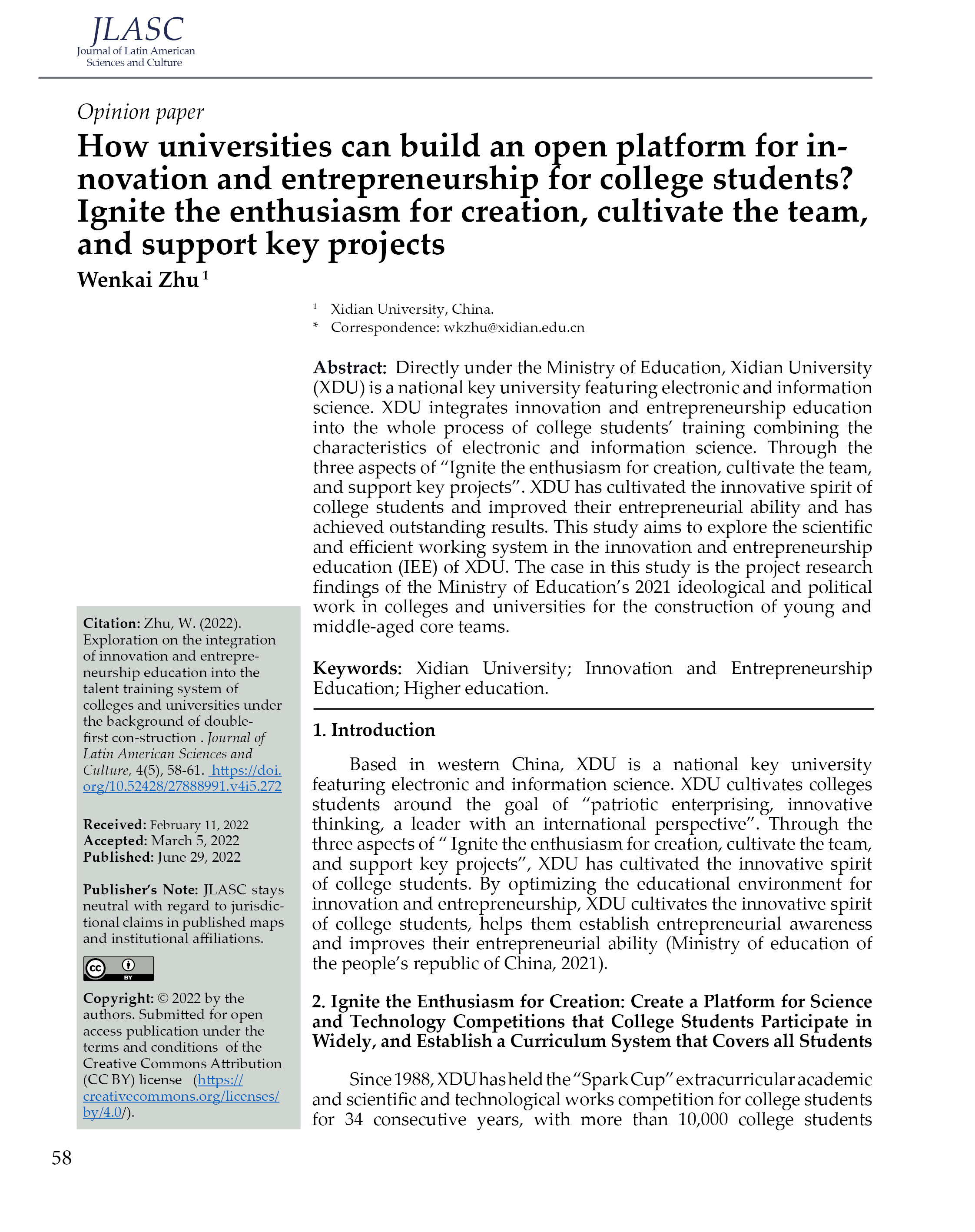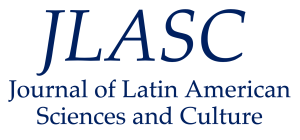How universities can build an open platform for innovation and entrepreneurship for college students? Ignite the enthusiasm for creation, cultivate the team, and support key projects
DOI:
https://doi.org/10.52428/27888991.v4i5.272Palabras clave:
Xidian University; Innovation and Entrepreneurship Education; Higher educationResumen
Directamente bajo el Ministerio de Educación, la Universidad de Xidian (XDU) es una universidad nacional clave que ofrece ciencias electrónicas y de la información. XDU integra la educación en innovación y emprendimiento en todo el proceso de formación de los estudiantes universitarios combinando las características de la electrónica y la ciencia de la información. A través de los tres aspectos de "Enciende el entusiasmo por la creación, cultiva el equipo y apoya proyectos clave". XDU ha cultivado el espíritu innovadorde los estudiantes universitarios y ha mejorado su capacidad empresarial y ha logrado resultados sobresalientes. Este estudio tiene como objetivo explorar el sistema de trabajo científico y eficiente en la educación en innovación y emprendimiento (IEE) de XDU. El caso en este estudio son los hallazgos de la investigación del proyecto del trabajo ideológico y político 2021 del Ministerio de Educación en colegios y universidades para la construcción de equipos centrales jóvenes y de mediana edad.
Descargas
Citas
Cabero Z., M. A. (2019). The Pillars of Excellence in Education in the New Era. Journal of Latin American Sciences and Culture, 1(1), 6-9. https://doi.org/10.52428/27888991.v1i1.37. DOI: https://doi.org/10.52428/27888991.v1i1.37
Guachi, R. (2019). Connection between industry and academy. Journal of Latin American Sciences and Culture, 1(1), 13-14. https://doi.org/10.52428/27888991.v1i1.39. DOI: https://doi.org/10.52428/27888991.v1i1.39
Liu, Yi, Zhao, Y.,& Zhu, W. (2020). Research on the 5th China college students “Internet+” innovation and entrepreneurship competition: Data analysis and policy Implication. The Theory and Practice of Innovation and Entrepre-neurship, 3(15), 166-172. https://kns.cnki.net/kcms/detail/detail.aspx?FileName=CXYL202015078&DbName=CJFQ2020.
Ministry of education of the people’s republic of China. Xidian University has built a high-quality dual-creation education system to enhance the ability of col-lege students to create double-creation. http://www.moe.gov.cn/jyb_xwfb/s6192/s133/s218/202112/t20211223_589658.html.
Wang, J., & Zhang, X-F. (2020). Research on the Construction of Entrepreneur-ship Education System for Electronic Information Majors Based on the initia-tive. China University Students Career Guide, 4(42), 46-52. https://kns.cnki.net/kcms/detail/detail.aspx?FileName=JIUY202004017&DbName=CJFQ2020.
Zhao, Y., & Zhang, G. (2021). Misunderstandings and countermeasures of innova-tion and entrepreneurship education in colleges and universities. The Theory and Practice of Innovation and Entrepreneurship, 4(3), 81-83. https://kns.cnki.net/kcms/detail/detail.aspx?FileName=CXYL202103036&DbName=CJFQ2021.
Zhu, W. (2018). Research on innovation and entrepreneurship education in the context of Big Data. Proceedings of the 3rd International Social Sciences and Education Conference (ISSEC 2018).

Archivos adicionales
Publicado
Cómo citar
Número
Sección
Licencia
Derechos de autor 2022 Journal of Latin American Sciences and Culture

Esta obra está bajo una licencia internacional Creative Commons Atribución 4.0.
Authors who publish in this journal agree to the following conditions: Authors retain copyright and grant the journal the right of first publication, with the work licensed under a Creative Commons Attribution 4.0 International License, which allows others to use the published work provided they acknowledge the authorship and initial publication in this journal. Authors may enter into separate, additional contractual agreements for the non-exclusive distribution of the version of the article published in this journal (e.g., posting it to an institutional repository or publishing it in a book), provided they clearly indicate that the work was first published in this journal. Authors are permitted and encouraged to share their work online (e.g., in institutional repositories or on personal websites) before and during the manuscript submission process, as this can lead to productive exchanges and increased and faster citation of the published work.








